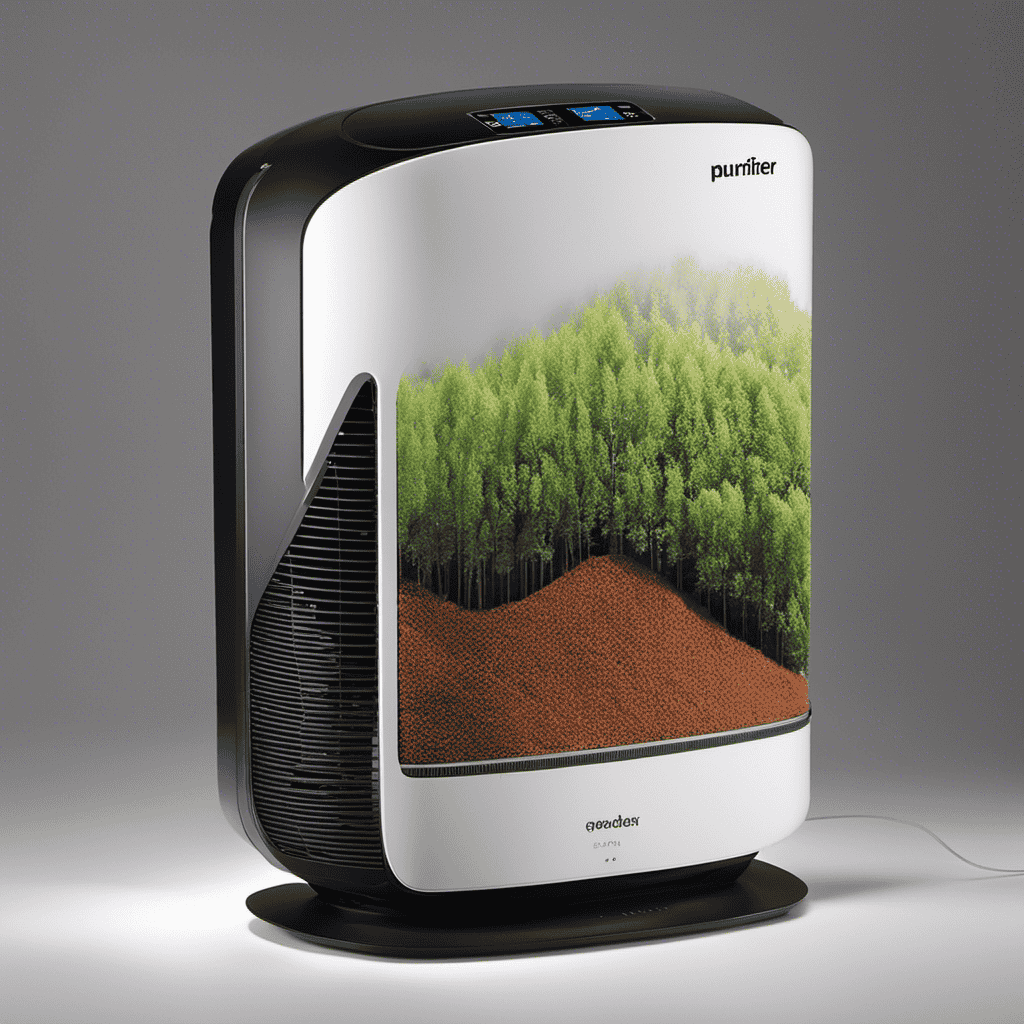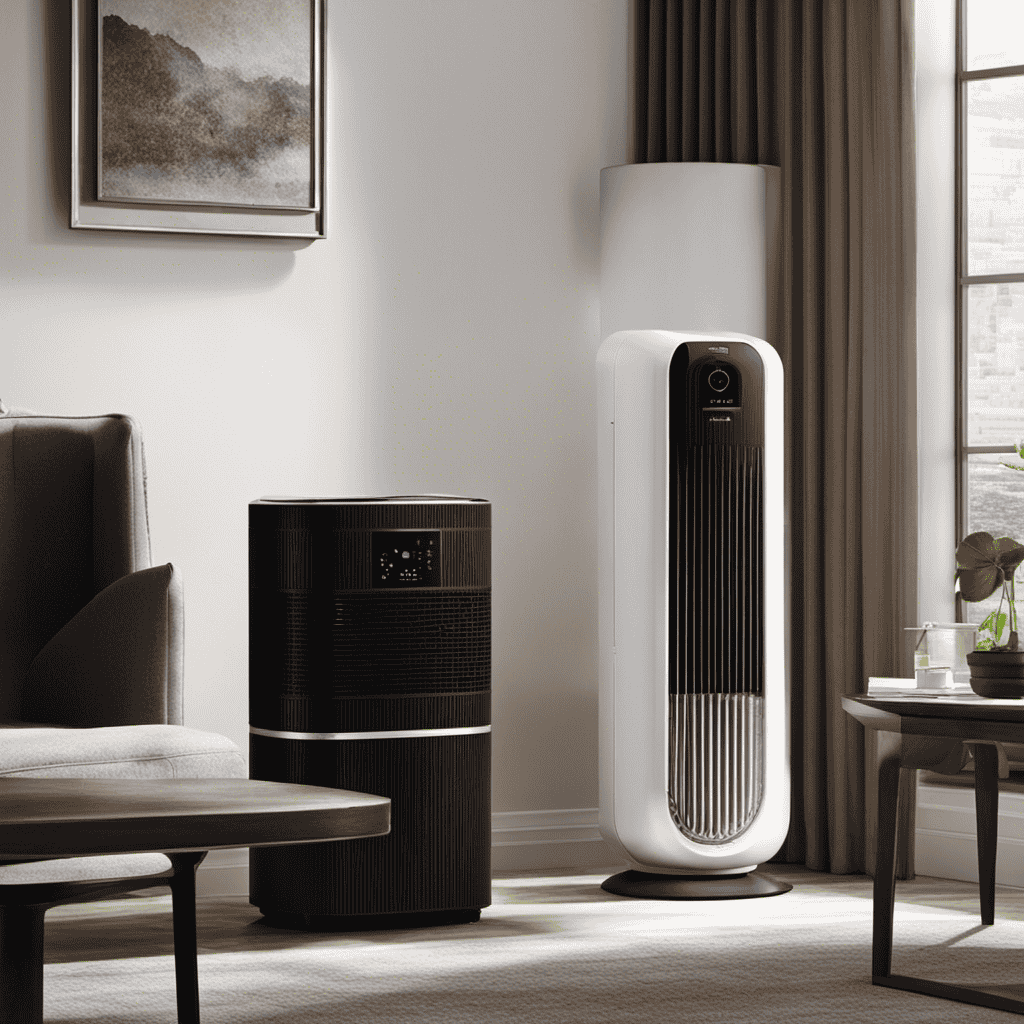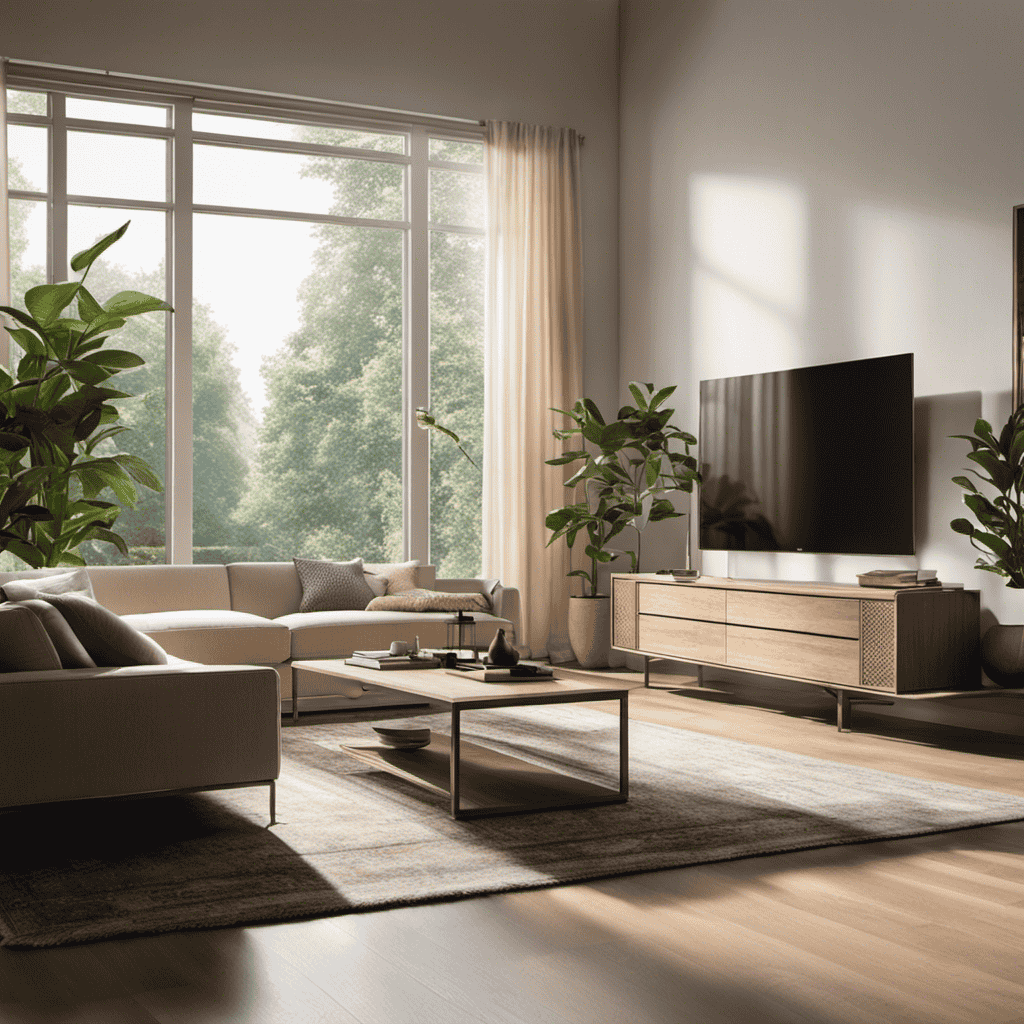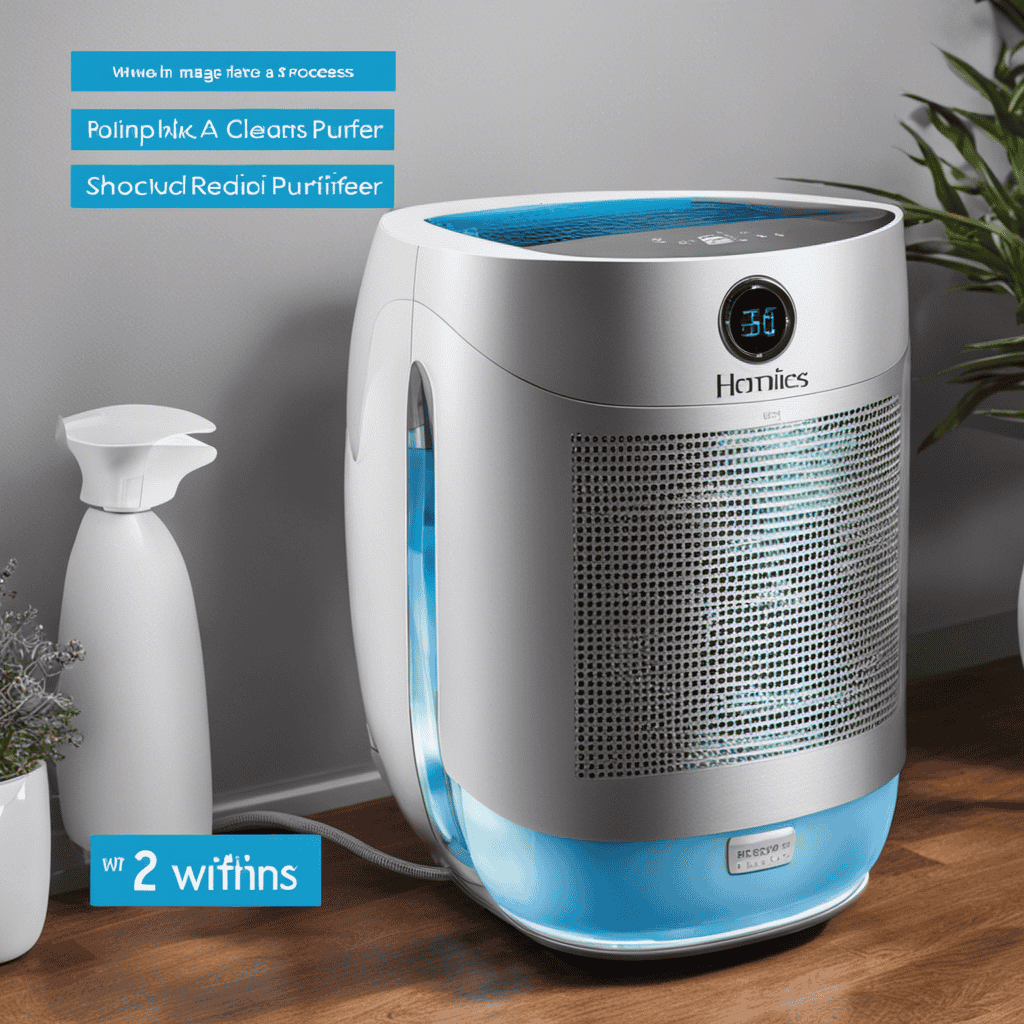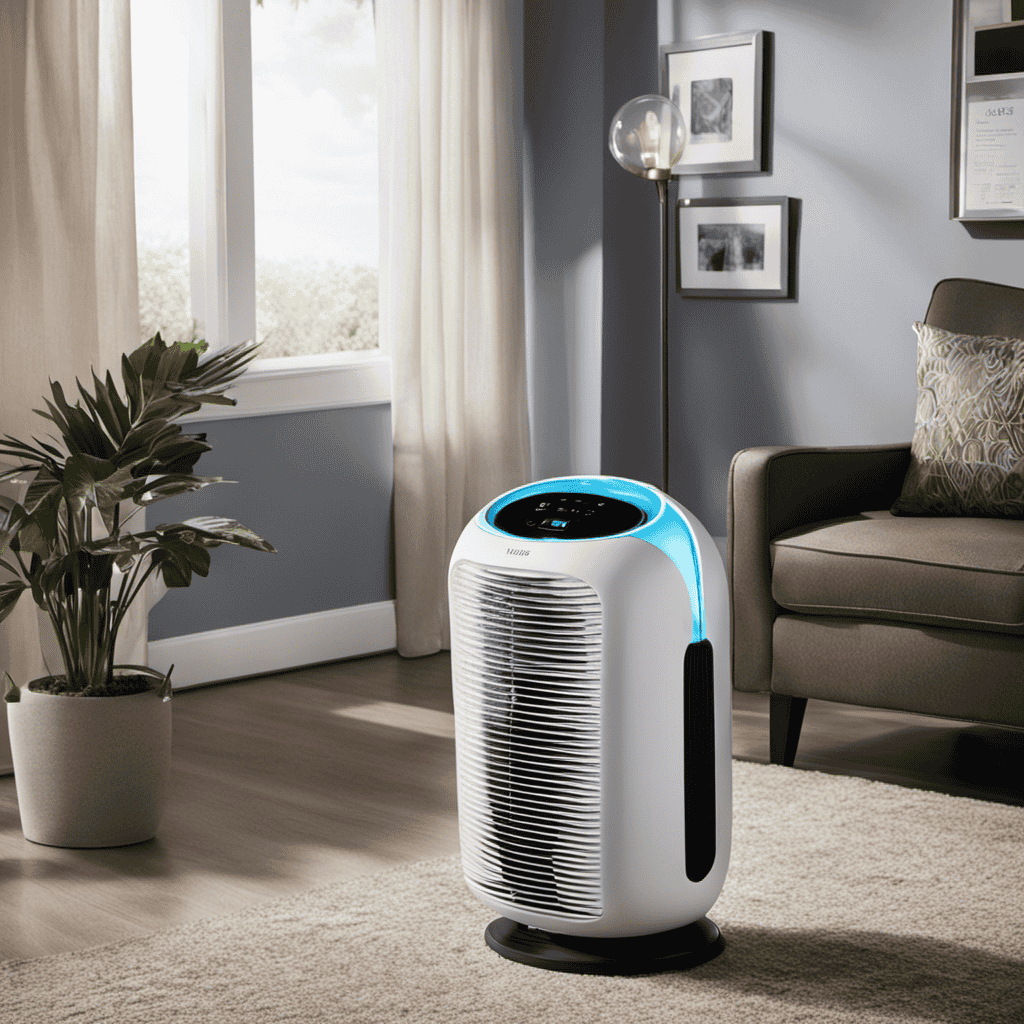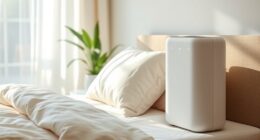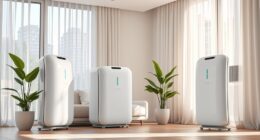Curious about how frequent you should change your air purifier, right? Let me explain it to you in simple terms. If you want to ensure clean and fresh air in your home, **regular maintenance** of your air purifier is key.
In this article, we’ll explore the factors that affect the lifespan of an air purifier, provide a recommended maintenance schedule, and discuss the signs that indicate it’s time for a replacement.
We’ll also dive into the world of air purifier filters and how often they should be cleaned. Plus, I’ll share some tips for choosing the right air purifier for long-term use and common mistakes to avoid.
Stay tuned, because we’ll even talk about when it’s necessary to upgrade your air purifier and how to properly dispose of old filters.
Let’s get started, shall we?
Key Takeaways
- The quality of air being filtered affects the lifespan of the air purifier.
- Regular maintenance, including filter replacement and cleaning, is crucial for optimal performance and longevity.
- Signs of decreased effectiveness in removing pollutants indicate the need for filter replacement.
- Following the manufacturer’s maintenance schedule and recommendations is important for prolonging the lifespan of the air purifier.
Factors Affecting Air Purifier Lifespan
There are several factors that can affect the lifespan of an air purifier.
One of the most important factors is the quality of the air being filtered. If the air is heavily polluted or contains large amounts of particles, the filter of the air purifier will need to work harder and may need to be replaced more frequently.
Another factor is the maintenance schedule followed by the user. Regular cleaning of the filter and other components is crucial to ensure optimal performance and longevity. It is recommended to follow the manufacturer’s maintenance schedule, which usually includes replacing the filter every 6 to 12 months.
Neglecting regular maintenance can lead to reduced efficiency and a shorter lifespan for the air purifier.
Recommended Air Purifier Maintenance Schedule
To keep your air purifier in good working condition, it’s recommended to follow a regular maintenance schedule. This ensures that your purifier continues to effectively remove pollutants from the air, providing you with clean and fresh indoor air.
Here are some key maintenance tasks to include in your schedule:
-
Filter Replacement: Regularly replace the air purifier filters according to the manufacturer’s instructions. This helps maintain the purifier’s efficiency and ensures that it continues to trap and remove airborne particles effectively.
-
Cleaning Frequency: Clean the exterior of the air purifier regularly to remove dust and dirt buildup. Use a soft cloth or a vacuum cleaner with a brush attachment to gently clean the surface.
-
Check for Damage: Inspect the purifier for any signs of damage, such as cracked casing or loose parts. If you notice any issues, contact the manufacturer for repairs or replacement.
-
Airflow Testing: Periodically test the airflow of your air purifier to ensure it’s working optimally. This can be done by placing a piece of tissue paper near the air outlet and observing if it moves or not.
Signs That Your Air Purifier Needs to Be Replaced
If you notice a decrease in the effectiveness of removing pollutants from the air, it may be time to consider replacing your air purifier. There are several factors that can affect the lifespan of an air purifier, including the quality of the air in your home, the level of pollutants present, and the regularity of maintenance. It is recommended to follow a maintenance schedule to ensure the optimal performance and longevity of your air purifier. Here is a table outlining the recommended maintenance tasks:
| Maintenance Task | Frequency |
|---|---|
| Replace air filters | Every 3-6 months |
| Clean pre-filters | Every 1-2 months |
| Check and clean internal components | Every 6-12 months |
| Monitor air quality indicators | Regularly |
Understanding Air Purifier Filter Lifespan
When it comes to air purifier filter lifespan, understanding the optimal filter replacement frequency is crucial. By replacing the filter at the appropriate time, you ensure that your air purifier continues to effectively remove pollutants from the air.
Additionally, being aware of the signs of filter deterioration, such as reduced airflow or a decrease in purification performance, can help you identify when it’s time for a replacement.
Lastly, there are ways to prolong the filter lifespan, such as regular cleaning and maintenance, which can save you money in the long run.
Optimal Filter Replacement Frequency
You should check the manufacturer’s recommendations for the optimal frequency to change your air purifier’s filter. Regularly replacing your air purifier filter is crucial for maintaining the effectiveness of your device and ensuring the quality of the air you breathe. Here are a few reasons why regular filter changes are important:
-
Improved Air Quality: A clean filter traps more pollutants, such as dust, allergens, and pet dander, ensuring cleaner and healthier air in your home.
-
Enhanced Performance: A clogged filter can strain the air purifier’s motor and reduce its efficiency. Regularly changing the filter helps the device work optimally.
-
Prolonged Lifespan: By preventing excessive strain on the air purifier, proper filter maintenance can extend the lifespan of the device.
-
Cost-Effective: Regular filter changes can help avoid expensive repairs or the need for a new air purifier altogether.
Signs of Filter Deterioration
Regularly replacing your air purifier’s filter is crucial for ensuring that it continues to effectively trap pollutants and maintain good indoor air quality.
There are several factors that can affect the performance of your air purifier’s filter, making regular filter maintenance even more important.
Over time, filters can become clogged with dirt, dust, and other particles, reducing their ability to effectively capture pollutants. Additionally, exposure to high levels of pollutants or contaminants can cause filters to deteriorate more quickly.
Signs of filter deterioration include decreased airflow, increased noise from the purifier, and a decrease in the overall effectiveness of the unit.
Prolonging Filter Lifespan
To ensure that your air purifier’s filters last as long as possible and maintain their effectiveness, there are a few strategies you can employ. By following these tips, you can prolong the lifespan of your filters and increase their durability:
- Regularly clean the pre-filter: This helps prevent larger particles from clogging the main filter and reduces strain on the system.
- Keep the air purifier in a clean environment: Avoid placing it in dusty areas to minimize the accumulation of particles on the filters.
- Use a vacuum cleaner attachment: Gently remove dust and debris from the filters to prevent clogging.
- Follow the manufacturer’s guidelines: Adhere to the recommended maintenance schedule and replace filters when necessary.
How Often Should You Clean Your Air Purifier
When it comes to cleaning your air purifier, following frequency guidelines is crucial for maintaining its effectiveness. Regular cleaning ensures that the filters and components are free from dust, allergens, and other particles that can hinder their performance.
Neglecting the cleaning process can have a significant impact, leading to reduced air quality, increased energy consumption, and potential damage to the unit itself.
Cleaning Frequency Guidelines
You should check the cleaning frequency guidelines to determine how often you need to change your air purifier. It is important to maintain a clean air purifier to ensure its optimal performance and the quality of the air in your home.
Here are some best practices for cleaning your air purifier:
- Regularly clean the pre-filter to remove large particles and debris.
- Use recommended cleaning products, such as mild soap and water, to clean the filter.
- Clean the filter housing and vents to prevent dust buildup.
- Vacuum the surrounding area to remove any dust or particles that may have accumulated.
Following these guidelines will help keep your air purifier running efficiently and effectively.
Neglecting regular cleaning can have a negative impact on the performance and lifespan of your air purifier, as well as the air quality in your home.
Impact of Neglecting Cleaning
Neglecting regular cleaning can significantly decrease the efficiency and lifespan of an air purifier, as well as negatively impact the air quality in your home. Dirty filters are one of the main culprits behind these issues. When filters become clogged with dust, dirt, and other pollutants, they are unable to effectively capture and remove harmful particles from the air. This leads to reduced purification efficiency and compromised air quality. Additionally, dirty filters can put strain on the purifier’s motor and fan, causing them to work harder and potentially leading to premature wear and tear. It is crucial to change the filters regularly to avoid these consequences and ensure optimal performance of your air purifier.
To emphasize the importance of filter maintenance, let’s take a look at the potential impacts of neglecting cleaning:
| Impact of Dirty Filters | Consequences of Not Changing Filters |
|---|---|
| Reduced efficiency | Decreased air purification |
| Shortened lifespan | Increased strain on motor and fan |
| Poor air quality | Exposure to harmful particles |
Extending the Life of Your Air Purifier
To extend the life of your air purifier, it’s important to regularly clean or replace the filters. Filters play a crucial role in trapping dust, allergens, and other pollutants, improving air quality in your home.
Here are some tips to help you maximize the lifespan of your air purifier filters:
- Clean or replace filters every 3-6 months, depending on usage.
- Vacuum pre-filters monthly to remove larger particles and debris.
- Use a soft brush to gently remove dust from HEPA filters.
- Consider using a washable pre-filter to reduce replacement costs.
By following these maintenance practices, you can ensure that your air purifier continues to operate at peak performance, effectively removing harmful particles from the air and improving the quality of the air you breathe.
Now, let’s explore some tips for choosing the right air purifier for long-term use.
Tips for Choosing the Right Air Purifier for Long-Term Use
When selecting an air purifier for long-term use, it’s important to consider the size of the room and the specific pollutants you want to target. Understanding air purifier technology can help you make an informed decision. To choose an eco-friendly air purifier, look for models that use energy-efficient motors and have filters made from recyclable materials. Additionally, consider the noise level and maintenance requirements of the purifier. To assist you in your search, here is a table comparing different air purifiers based on their room coverage, filter type, noise level, energy consumption, and maintenance needs:
| Air Purifier | Room Coverage | Filter Type | Noise Level | Energy Consumption | Maintenance |
|---|---|---|---|---|---|
| Model A | 300 sq ft | HEPA | 40 dB | 50W | Low |
| Model B | 500 sq ft | Activated | 35 dB | 40W | Medium |
| Model C | 800 sq ft | Electrostatic | 45 dB | 60W | High |
| Model D | 1000 sq ft | UV-C | 50 dB | 70W | Low |
| Model E | 1200 sq ft | Ozone | 55 dB | 80W | Medium |
Common Mistakes That Shorten Air Purifier Lifespan
Make sure you regularly clean the filters of your air purifier to avoid common mistakes that can shorten its lifespan. Cleaning the filters is essential for maintaining the performance and longevity of your air purifier.
Here are some factors that can affect the performance of your air purifier:
- Lack of regular filter cleaning: Neglecting to clean the filters can result in clogged filters, reducing the airflow and efficiency of the air purifier.
- Incorrect filter placement: Placing the filters in the wrong position or direction can hinder the proper filtration process.
- Running the air purifier on the wrong setting: Choosing the wrong setting can lead to excessive strain on the motor, decreasing its lifespan.
- Ignoring maintenance indicators: Many air purifiers have built-in indicators that signal when it’s time to clean or replace the filters. Ignoring these indicators can lead to decreased performance and a shorter lifespan.
To avoid these common misconceptions and mistakes, make sure to clean the filters regularly and follow the manufacturer’s instructions for proper maintenance.
Upgrading Your Air Purifier: When Is It Necessary
As an expert in air purifiers, I’m well aware of the signs that indicate an outdated purifier. These signs may include reduced effectiveness in removing pollutants, frequent breakdowns, and increased noise levels.
Upgrading your air purifier not only improves the air quality in your home but also has several health benefits, such as reducing allergies and respiratory issues.
However, it’s important to consider the efficiency versus cost tradeoff when deciding on a new purifier, as higher efficiency models may come with a higher price tag.
Signs of Outdated Purifier
If your air purifier is emitting strange odors or making unusual sounds, it may be time for an upgrade. There are several signs that indicate your air purifier is outdated and needs to be replaced. These include:
- Decreased effectiveness in removing allergens and pollutants from the air.
- Continuous clogging of the filters, requiring frequent replacements.
- Inefficient airflow, resulting in poor air circulation in the room.
- Higher energy consumption and increased electricity bills.
Factors affecting the performance of your air purifier can include the size of the room, the level of pollution, and the quality of the filters.
Troubleshooting common issues such as strange odors or unusual sounds can sometimes be resolved by cleaning or replacing the filters. However, if these problems persist, it is advisable to consider upgrading to a newer model that offers better performance and efficiency.
Health Benefits of Upgrading
Upgrading your air purifier can improve your health by reducing the presence of allergens and pollutants in the air. The health benefits of upgrading your air purifier are numerous and significant.
By improving air quality, you can alleviate symptoms of allergies, asthma, and other respiratory conditions. Upgraded air purifiers are equipped with advanced filtration systems that effectively capture and eliminate airborne particles such as dust, pollen, pet dander, and mold spores. These purifiers also have the ability to remove harmful volatile organic compounds (VOCs) and odors from the air, creating a cleaner and fresher indoor environment.
With a higher efficiency rating, upgraded air purifiers can provide cleaner air more effectively, allowing you to breathe easier and experience improved overall health.
Efficiency Vs. Cost Tradeoff
When it comes to air purifiers, efficiency and cost are two important factors to consider. You want an air purifier that effectively filters out pollutants and keeps the air in your home clean, but you also want to find a cost-effective option that doesn’t break the bank.
To strike the right balance between efficiency and cost, it’s important to compare the lifespan of different air purifiers and their overall effectiveness. Here are some cost-effective air purifier options to consider:
-
HEPA filters: These filters are highly efficient in removing particles as small as 0.3 microns, making them a popular choice for allergen removal.
-
Activated carbon filters: These filters are effective in removing odors and chemical pollutants from the air.
-
UV-C light technology: This technology kills airborne bacteria and viruses, making it an excellent option for germ control.
-
Electrostatic precipitators: These purifiers use an electrostatic charge to trap particles and remove them from the air.
How to Properly Dispose of Old Air Purifier Filters
You should properly dispose of old air purifier filters to ensure proper waste management.
When it comes to proper disposal, there are a few recycling options available. One option is to check with your local recycling center to see if they accept air purifier filters. Some centers have specific guidelines for recycling filters, so it’s important to follow their instructions.
Another option is to contact the manufacturer of your air purifier. Many manufacturers offer recycling programs for their filters, allowing you to send them back for proper disposal.
Additionally, some retail stores that sell air purifiers may have drop-off locations for old filters.
Conclusion
Well, folks, it seems that our beloved air purifiers have quite the limited lifespan. Who knew? After diving into the depths of air purifier maintenance and filter lifespan, it’s clear that these little machines don’t last forever.
So, next time you’re basking in the fresh, clean air of your home, just remember that it won’t last forever. Keep an eye out for those signs of wear and tear, and when the time comes, bid farewell to your trusty air purifier.
It’s been a good run, my friend.
